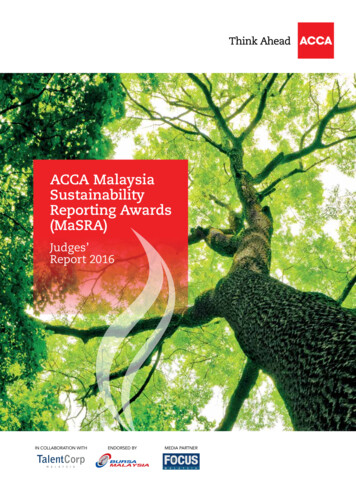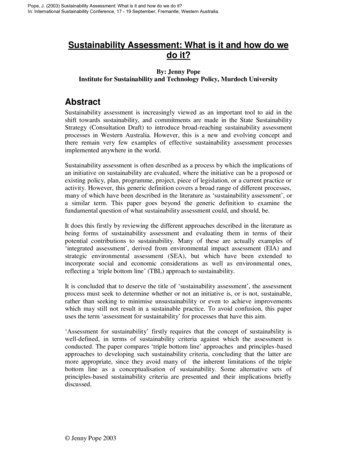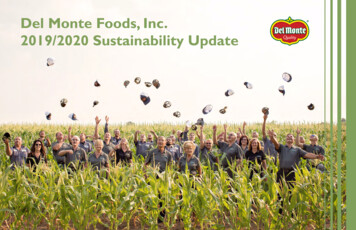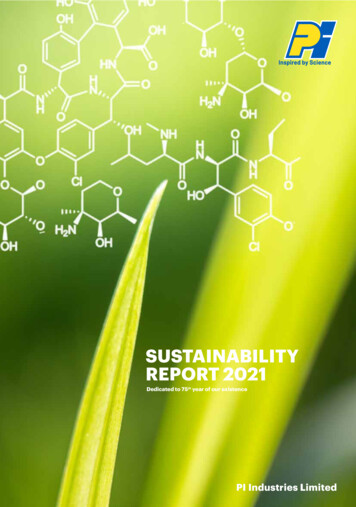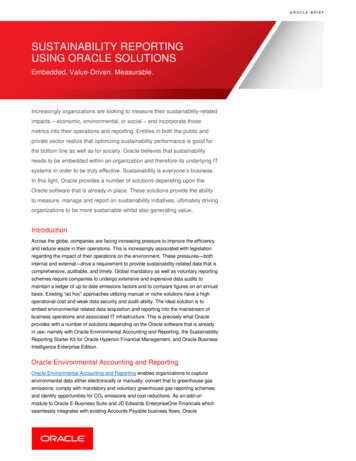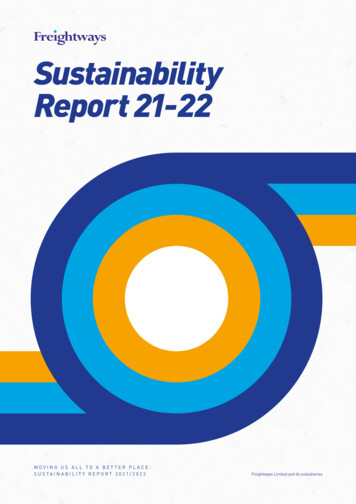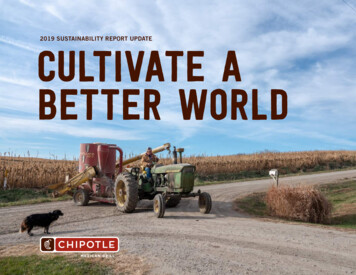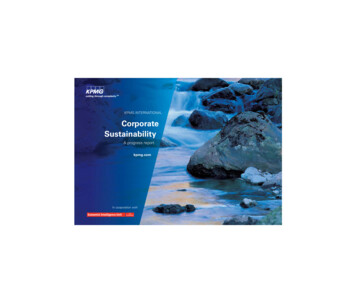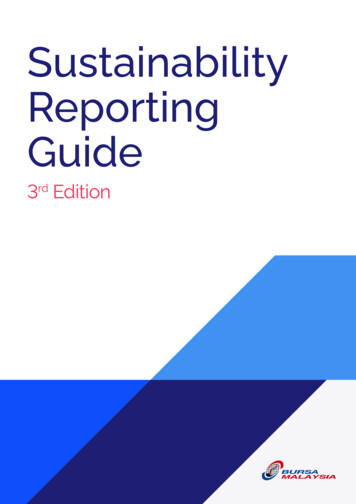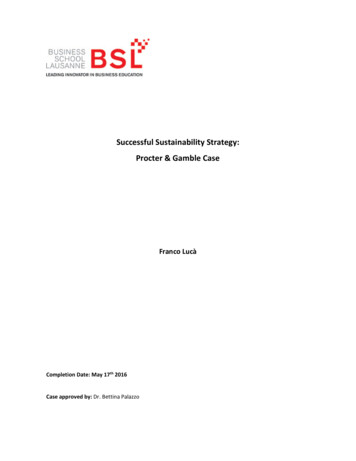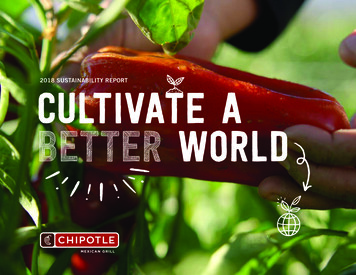
Transcription
2018 SUSTAINABILITY REPORTCULTIVATE ABETTER WORLD
Food & Animals I People I Environment2018 Sustainability ReportCULTIVATE A BETTER WORLD2018Food &AnimalsPEOPLECHAPTERCHAPTERCHAPTER123Envir0nment2
Food & Animals I People I Environment2018 Sustainability ReportTable of ContentsINTRODUCTIONFOOD & ANIMALSPEOPLEENVIRONMENTFORWARD-LOOKINGSTATEMENTP. 4P. 15P. 45P. 75A Letter from Our CEO . . . . . . . . . . 4Letter from Carlos Londono . . . . 16Letter from Marissa Andrada . . 46Letter from Caitlin Leibert. . . . . . 76About This Report . . . . . . . . . . . . . . 5Food & Animal Goals . . . . . . . . . . 17People Goals . . . . . . . . . . . . . . . . . . 47Environment Goals . . . . . . . . . . . . 77GRI INDEXAbout Chipotle . . . . . . . . . . . . . . . . . 6Our Supply Chain . . . . . . . . . . . . . . 18Our Values . . . . . . . . . . . . . . . . . . . 48Climate Change . . . . . . . . . . . . . . . 79P. 98Our 2018 Impact. . . . . . . . . . . . . . . . 7Our Produce . . . . . . . . . . . . . . . . . . 21Employees . . . . . . . . . . . . . . . . . . . 49Waste Management. . . . . . . . . . . 80Our Achieved Goals . . . . . . . . . . . . 10Local Produce Program . . . . . . . 22Diversity & Inclusion . . . . . . . . . . . 63Food Waste . . . . . . . . . . . . . . . . . . 84Our New Goals . . . . . . . . . . . . . . . . . 11Our Meat & Dairy . . . . . . . . . . . . . 25Ethics . . . . . . . . . . . . . . . . . . . . . . . 64Packaging . . . . . . . . . . . . . . . . . . . . 87Industry Leadership . . . . . . . . . . . 12Animal Welfare . . . . . . . . . . . . . . . 28Philanthropy . . . . . . . . . . . . . . . 65Energy . . . . . . . . . . . . . . . . . . . . . . 89Materiality . . . . . . . . . . . . . . . . . . . . 14Our Ingredients . . . . . . . . . . . . . . 30Customers . . . . . . . . . . . . . . . . . . . . 70Emissions . . . . . . . . . . . . . . . . . . . . . 91Our Suppliers . . . . . . . . . . . . . . . . . 32Governance . . . . . . . . . . . . . . . . . . . 71Water Management . . . . . . . . . . . . 95Food Safety . . . . . . . . . . . . . . . . . . 34Stakeholder Engagement . . . . . . 74P. 973
Food & Animals I People I Environment2018 Sustainability Report4INTRODUCTIONA LetterfromOur CEO102-10, 102-14When I joined Chipotle in early 2018, I knew wehad opportunities for growth in front of us. I knewChipotle served fresh, delicious food. And I knewsustainability was at the core of our culture.But what I’ve learned in the year since is just how essentialsustainability is to our mission—and how innovative Chipotlehas been in changing the way people think about andeat fast food. Our real ingredients are responsibly sourcedand classically prepared with people, animals, and theenvironment in mind. Everything is connected.In this, our second full Sustainability Report, we’re focusedon our mission of cultivating a better world in three corecomponents of our work: food and animals, people, and theenvironment. Throughout, we’re explaining the way we governand manage this work as well as how we are working to leadthe industry. You’ll hear directly from leaders across ourorganization about how they’re embedding sustainabilityinto the work we do together every day.I’m very excited about the fact that we’ve focused on thefundamentals since I’ve joined the team. That’s going to allowus to innovate even better together. We’ve been relentlessin our pursuit of our customers’ trust, and of preparing themost delicious food, made of the most responsibly sourcedingredients.There’s a lot of growth ahead of us at Chipotle, and I’m soproud that our commitment to sustainability is stronger thanever; that’s what’s going to continue to shape our work goingforward. Our best asset is our team members that are trained,passionate and excited, creating a great guest experiencewith the best food. Sustainability is the backbone of thatexperience they’re creating and influences our strategy fromour restaurants, to our company offices, to the farms fromwhich we source our ingredients.Last year, we published a progress report against oursustainability goals through 2017. At that time, I talked abouthow we are committed to being transparent and buildingtrust as we continue to raise the bar in this very importantarea. I talked about how we were starting to transform ourorganization to ensure we had world class talent in eacharea of business.I’m really proud of Chipotle and what we’re doing togetherto Cultivate a Better World. I’m so optimistic about whereour culture is going and what makes Chipotle special, and Iappreciate you joining us to learn more about it. I invite youto reach out to us at SustainabilityReporting@chipotle.comand share your thoughts and questions about whatsustainability means to Chipotle. We’re all in this together.Today, that’s truer than ever: we’ve revived our organization’sfocus on creativity and accountability. We’ve attracted someof the best talent in key areas of our company, and that’shelping us drive real progress toward our sustainabilitygoals. We’re focused on what makes Chipotle special: realingredients, real cooking, customized at a terrific value.As we bring this food experience to customers, we knowwe have to do so in a way that sets new and higherstandards for what sustainability looks like.Sincerely,Brian NiccolChief Executive OfficerChipotle Mexican Grill
Food & Animals I People I Environment2018 Sustainability Report5INTRODUCTIONAbout This Report2018 was a transformativeyear for Chipotle. Althoughmany things have changed, ourcommitment to our core values,including sustainability, has not.In keeping with those core values, we are proud to releaseour 2018 Sustainability Report to transparently share ourefforts and impacts to fulfill our mission of cultivating abetter world.In compiling this report, we’ve engaged stakeholders;gathered and audited our environmental, social, andgovernance (ESG) data; worked with our leadership teamto ensure alignment; and identified new ways to revisitour internal sustainability operations. To determine thecontent of our 2018 Sustainability Report, we referenced thepreviously published materiality assessment, conducted bya third party for our 2016 report, to identify the topics,or material issues, most important to our business accordingto the opinion of key internal and external stakeholders.As mentioned in our inaugural report, we intend to102-32, 102-45, 102-46, 102-50, 102-51, 102-52, 102-53, 102-54continue publishing a Sustainability Report every otheryear and a progress report every year between fullreports. As such, we will publish our next full report in2021, based on 2020 data.Caitlin Leibert, Director of Sustainability at Chipotle, ledthe reporting process. She reports to Laurie Schalow, ChiefCorporate Reputation Officer, who has provided oversightof the reporting process.The data in this report covers activities and initiatives thatoccurred during the 2018 calendar year unless otherwisestated. The report covers our owned and managedoperations, including leased real estate.Thank you for taking the time to read our secondSustainability Report. We’re genuinely grateful that you’retaking the time to read about our progress and efforts, andwe hope you find it even more transparent and compellingthan the first. Sustainability reporting is a journey, andwe’re always looking to improve. We are eager to hear yourfeedback and answer any questions you may have. Pleasecontact us via SustainabilityReporting@chipotle.com.As part of this reporting process, we’ve taken a close lookat our operations and how we track our data. We continueto assess Chipotle’s ESG impacts across our supply chain,and we’re always working to fully understand and measurethe environmental and social impacts of our businessacross our entire value chain.This report is aligned with the Global Reporting Initiative’s(GRI) Standards reporting framework, in accordance withthe “Core” level. GRI is an international standard thatpromotes transparent disclosure of our ESG performance.It also provides a tool for stakeholders to compareChipotle’s performance with our peers on metrics thatmay be deemed material.
Food & Animals I People I EnvironmentINTRODUCTIONAbout ChipotleThe idea behind Chipotle issimple: food served fast doesn’thave to be “fast food”.Using high-quality, wholesome ingredients, classic cookingtechniques, and an interactive service format where guestschoose exactly what they want, we strive to make delicious,sustainable food accessible to all in a welcoming andengaging environment.We’ve been devoted to sourcing and cooking the bestingredients since we opened the doors of the first Chipotlein 1993. Today, more than 2,500 restaurants later, we are aleader in “fast-casual” dining—the fastest growing categoryof the restaurant industry—where the ethos of full-servicerestaurants is combined with the convenience of fast food.In 2018, we operated three brands: Chipotle, PizzeriaLocale (a restaurant concept we created to help extend ouringredients-first mission into the pizza world), and TastyMade. As of December 31, 2018, we operate just Chipotle andPizzeria Locale. Chipotle Mexican Grill is publicly traded onthe New York Stock Exchange as CMG. In 2018, we movedour headquarters (Restaurant Support Centers) to NewportBeach, California, and Columbus, Ohio. We operate restaurantsin the United States, Canada, the U.K., Germany, and France.102-2, 102-4, 102-5, 102-6, 102-452018 Sustainability Report6
Food & Animals I People I Environment2018 Sustainability ReportINTRODUCTIONOur 2018 ImpactFood & AnimalsPurchased 23.7 million poundsof organic ingredients9 years: Average lengthof time we’ve been workingwith our pork suppliers100% of our chicken had noantibiotics, no added hormones,and was humanely raisedPurchased over 5.8 millionpounds of Certified Humaneor Global Animal Partnership(GAP) Certified porkPurchased 29 million poundsof locally grown produceOver 50% of our pork wasRed Tractor and Royal Societyfor the Prevention of Cruelty toAnimals (RSPCA) ApprovedPurchased over 32 millionpounds of grass-fed beef11% of all produce purchasedwas grown locally*Purchased over 19.5 millionpounds of Certified Humaneor Global Animal Partnership(GAP) Certified beef9 years: Average length of timewe’ve been working with ourdairy suppliers100% of our beef hadno antibiotics, no addedhormones, and washumanely raisedPurchased over 77 million poundsof dairy from animals raised withdaily access to the outdoors andno tail docking or tethering241: number of meat anddairy supplier farm and plantaudits we conducted in 2018for animal welfare across23 different U.S. states100% of our pork hadno sub-therapeutic antibiotics,no added hormones, and washumanely raisedPurchased 94,712,560 poundsof American HumaneCertified (AHC) chicken12 years: Average length of timewe’ve been working with ourbeef suppliers* We explain more about our local produce program in the Local Growers Program section.7
Food & Animals I People I Environment2018 Sustainability ReportINTRODUCTIONOur 2018 ImpactPeopleDonated over 15.5 millionto local communityorganizationsGranted over 800,000through our ChipotleCultivate FoundationDonated 70,000 tocharities via corporategiving effortsDonated over 290,000pounds of food to thosein need in our communitiesDonated over120 pieces of equipmentfrom our restaurantsGave 540,000 todisaster relief effortsHosted over58,200 fundraisersin our restaurantsPromoted 13,689 ofour people at all levelsProvided over 10.5 millionin total tuition assistance to2,600 employees8
Food & Animals I People I Environment2018 Sustainability ReportINTRODUCTIONOur 2018 ImpactEnvironment100% of our bowlswere made from compostable,plant-based fiberOver 450 restaurantswith a compost programRoughly 20% of the electricitywe used to power ourrestaurants was renewable42% of all of ourwaste divertedfrom the landfillReduced our energy consumptionby 12,525,812 KwHthroughout our restaurantsRecycled over1,285,000 cubic yardsof wastePiloted a new closed looprecycling program toturn our used plastic glovesinto our trash bagsReduced our averagerestaurant waste by 25%9
Food & Animals I People I Environment2018 Sustainability Report10INTRODUCTIONOur Achieved Goalsfrom the 2016 ReportWe’re proud of the progress we’ve madesince we published our 2016 SustainabilityReport, and continue to set aggressivetargets to measure and mitigate our impacts.We have successfully met the following goals:Increase the total pounds of producepurchased from local growers in 2017Introduce compostable bowls at allrestaurant locationsReduce overall average waste perrestaurant by 5% by 2020Seek to achieve a higher ratingwith the Business Benchmark onFarm Animal Welfare (BBFAW) byimproving our animal welfare practiceswherever possible and continuing tobe transparent in our communicationsin 2018 (achieved Tier 3 from Tier 4 inprevious years)Explore third-party certificationprograms to validate best-in-classantibiotic protocols for our pork supplyin 2018Calculate and assure our Scope 1 andScope 2 emissions in 2017 and 2018 andpublish the data.Continue to work with our chickensuppliers to advance broiler chickenwelfare with respect to environmentalenrichments, natural lighting, improvedstocking density, and controlledatmospheric stunRequest information about and reviewsustainability efforts with key logisticpartners by 2019
Food & Animals I People I Environment2018 Sustainability Report11INTRODUCTIONOur New GoalsFood & AnimalsPeopleEnvironment Increase both the total pounds of produce purchased fromlocal growers and the number of growers in our LocalGrowers Program in 2019 Expand our Local Growers Program beyond produce toinclude meat, dairy and other applicable ingredients by 2020 Continue to work with our chicken suppliers to advancebroiler chicken welfare with respect to environmentalenrichments, natural lighting, improved stocking density, andcontrolled atmospheric stun Increase total pounds of pork produced domestically bysmall- to medium-sized farms (those that sell 10 to 1,000hogs per year) by 5% in 2019 Increase non-GMO feed given to chickens in our supply chainto 45% by 2020 In an effort to ensure farmers are compensated fairly, mapmeat & dairy farmer networks to ensure all of our premiumsreach the individual farmer throughout the supply chain Increase both the total pounds and total percentage oforganic rice, beans, and tortillas purchased by 2021 Make our Employee Assistance Program (EAP) available toall employees so they have access to quality mental healthcare by 2020 Expand benefit coverage for both Kitchen Managersand Service Managers, giving them access to the samebenefits as our General Managers (GMs) and Field Leadersby 2020 Expand tuition assistance for all employees to coverthe cost of their dependents for General EducationDevelopment (GED) and English as a Second Language(ESL) classes by 2020 Develop and conduct unconscious bias training for all FieldLeaders in 2019 Create at least three Employee Resource Groups (ERGs)throughout the organization in 2019 that will sparkdiscussions and allow for employees to play an active rolein shaping our culture and company practices Expand our Diversity & Inclusion program through strategicrecruiting and development practices in 2019 Realize less than 25% GM turnover by 2020 Implement a GM success profile and establish acompetency-based interview guide, which will be used toaid Field Leaders in identifying and hiring candidates Implement an improved performance review process in2019 for all employees Divert 50% of our waste from landfills by 2020, against abaseline of a 37% diversion rate at the end of 2016(42% at the end of 2018) Ensure 100% of our new restaurant openings in 2019participate in our food donation “Harvest Program” Ensure 100% of our restaurants are participating in alandfill diversion program by 2020, against a baseline of81% at the end of 2016 (88% at the end of 2018)* Set up and maintain a recycling program at 95% of allrestaurants by 2020, against a baseline of 80% at the endof 2016 (87% at the end of 2018)* Set up and maintain a composting program at 25% of allrestaurants by 2020, against a baseline of 10% at the end of2016 (18% at the end of 2018) Reduce overall average waste per restaurant per week by30%, to 22 cubic yards, by 2020, from a baseline of 32cubic yards per week in 2016 Reduce our landfill-bound waste to 15% of our total wasteby 2025, against a baseline of 22% at the end of 2018 Install an Energy Management System (EMS) at allrestaurants by 2020, against a baseline of 89% at the endof 2018* Increase the amount of renewable energy that we source,as part of our electric energy portfolio, by 2020, against abaseline of 20% in 2018 Fully measure and report our Scope 3 emissions by 2025 Reduce overall inbound truckloads by 5% in 2019 Reduce the amount of plastic in our cutlery by 20% by theend of 2020 Pilot-test a recyclable or compostable soda cup and lid bythe end of 2020 Expand the closed-loop glove-to-trash bag pilot program toinclude more restaurants* Revised goal from 2016 Sustainability Report
2018 Sustainability ReportFood & Animals I People I Environment12INTRODUCTIONIndustry LeadershipAs a leader in fast-casual dining,we recognize our ability—and ourresponsibility—to set high standardsof excellence and to influencethose around us. It’s our goal tomake better food, made with realingredients, available to everyone.We work to create industry-leading policies and enforceresponsible practices in the fields of sustainable agriculture,animal welfare, genetically modified organisms (GMOs),preservatives, colors, flavors, and other industrial additives.We passionately advocate for our customers and employeesand, with this report, we are working to share more abouthow we also advocate for the animals, farmers, and otherswho touch our supply chain. We do this by enforcing strictproduction and welfare standards for everything from limesto pork, and by partnering with industry groups to share notonly what works for us but also where we face challenges.Additionally, advocacy is an important component of ourbroad sustainability platform.102-16There are many sourcing, labor, and environmentalchallenges and opportunities unique to the food servicesindustry. While Chipotle has always worked to share itscommitment to responsibly sourced, delicious food with ourcustomers, we also want to share our specific actions andpriorities in this report.Chipotle was the first national restaurant brand to sell foodwith no artificial colors, flavors or preservatives in any ofits ingredients. We were the first national restaurant brandto use only meat from animals raised responsibly, and tocreate and maintain commitments to local and organicallygrown produce. We were the first national restaurantcompany to disclose the GMO ingredients in our food, andlater, to prepare our food using only non-GMO ingredients.We were also the first restaurant to achieve LEED PlatinumCertification from the United States Green BuildingAssociation.Our attention to responsible sourcing allows us to lookseveral years down the road at the trends that may impactnot only our ability to find the ingredients we want, but alsothe ability of our competitors and industry partners to dothe same. The cost of certain ingredients, and whether othercompanies will be able to shoulder the effort of procuringand paying for them alongside us, will present challenges. Asour business grows, we will uncover even more opportunitiesto innovate. And, more than ever, building and maintainingtrust with our customers, especially in an age whereinformation is shared faster than ever, is an ongoing priority.
2018 Sustainability ReportFood & Animals I People I Environment13INTRODUCTIONMaterialityIn preparing this report, we referenced our 2016 third-partymateriality assessment to identify the environmental, social,and governance (ESG) issues most relevant to our internaland external stakeholders, as well as to specify those issuesthat are within our control.We assessed 41 topics across the financial, operational, andreputational aspects of our business—assessing both ourdegree of control and each topic’s potential future impact.Through this materiality assessment, we identified the 14highest priority issues for our business.We evaluated each issue for its potential business impact,level of stakeholder concern, and our degree of control.Our methodology included several inputs and analyses: External insights, gathered through a trends analysis, peerbenchmarking, and eight external stakeholder interviews.This external analysis included a review of key reports; abenchmark analysis of eight companies; a review of customersurveys by Chipotle; and interviews with non-governmentalorganizations (NGOs), academics, investors, and suppliers Internal insights, gathered through 14 interviews withexecutives and staff, a survey of 22 staff members, anda review of reporting materials Initial and refined material issues and sub-issues, a list ofwhich follows102-15, 102-44, 102-46, 102-47, 103-1, 103-2, 103-3Our third-party consultant developed a list of topics itdetermined to be most important to our business based onits interviews with internal and external stakeholders.These topics are: Attraction & Retention of Talent Climate Change Management Community Investment Customer Health & Wellness Energy & Greenhouse Gas Management Ethical Business Practices Fair Labor Practices Food & Agriculture Advocacy Food Safety & Quality Food Security & Affordability Responsible Food Sourcing Transparency & Disclosure Water ManagementOur materiality matrix, based on stakeholder feedback,maps business impact and stakeholder concern from low tohigh. We overlaid these results with our assessment of thedegree to which Chipotle has control over each subset ofESG issues.Reporting on Material IssuesTo align with the Global Reporting Initiative (GRI)Standards, we’ve used the results of this materialityassessment to shape the content of this report.
Food & Animals I People I Environment2018 Sustainability Report14INTRODUCTIONMaterialityHIGHKEYFOOD SAFETY& QUALITYCUSTOMER HEALTH &WELLNESSFARMSPEOPLERESPONSIBLEFOOD SOURCINGCUSTOMERSWASTEMANAGEMENTTRANSPARENCY &DISCLOSUREFAIR LABOR PRACTICESRESTAURANTSGOVERNANCECLIMATE CHANGEMANAGEMENTETHICAL BUSINESSPRACTICESENERGY &GREENHOUSEGAS MANAGEMENTFOOD &AGRICULTUREADVOCACYHIGH DEGREEOF CONTROLATTRACTION &RETENTION OF TALENTMODERATEDEGREEOF CONTROLFOOD SECURITY &AFFORDABILITYLOW DEGREEOF CONTROLWATERMANAGEMENTCOMMUNITY INVESTMENTLOWHIGHBUSINESS IMPACT
Food & Animals I People I EnvironmentCHAPTER1Food &Animals2018 Sustainability Report100%15OF OUR MEAT COMES FROM ANIMALSTHAT HAD NO ADDED HORMONES ORSUB-THERAPEUTIC ANTIBIOTICSWE PURCHASED32 Millions lbsOF GRASS-FED BEEF11%OF ALL PRODUCE SERVEDWAS GROWN LOCALLY(29 MILLION LBS)
Food & Animals I People I Environment2018 Sustainability Report16FOOD & ANIMALSLetter fromCarlos LondonoHEAD OF Supply ChainAs our new Head of Supply Chain,I am honored and delighted tointroduce the Food & Animalssection of our Sustainability Report.Since coming on board in May of 2018, theteam has focused on expanding our FoodWith Integrity efforts through a “valuesdriven” approach to managing our business.It is our belief that to Cultivate a BetterWorld, we must lead with this values-basedmentality throughout our entire network.We have made great progress and willcontinue to tackle the challenges in thejourney toward developing a sustainablesupply chain.We firmly believe that, at Chipotle, we arecultivating a better world. This purposedrives our decisions in every part of thesupply chain; from the farmers who grow andraise the ingredients, to the crew memberswho serve our delicious food every day inour restaurants. We are committed to thedevelopment of the partners involved in allportions of this human network.Our purpose drives the actions across oursupply chain. We are continuously looking forways to eliminate waste and gain efficienciesso that we can reinvest in our Food WithIntegrity program. We are addressing keychallenges and building a world-class teamthat supports and develops our farmers anddelivers value to our stakeholders. This lesstransactional approach focuses on robustprocesses, technology and human capitaldevelopment which supports the businesscase for Food With Integrity. Under thisframework we want to decouple cost andsustainability decisions.We have established very strong longterm relationships with key suppliers. Thecontribution from these great partnershas allowed Chipotle to further strengthenour values-based approach. We have foundthat nurturing and deepening relationshipsultimately allows us to create strongprograms in animal welfare, local produceand land stewardship. Additionally, thesepartnerships have helped us to fortify foodsafety protocols and procedures, and tooptimize our operations to reduce carbonfootprint. Our deep commitment to thesepartnerships has allowed us to gain greaterefficiencies and re-invest in our partnersand programs. Our co-investment cyclehas allowed us to continue to advance ourFood With Integrity efforts in a trulysustainable way.There are still challenges ahead. Throughoutthis journey, the Supply Chain team willcontinue to work to provide the bestingredients from the best sources, safely andaffordably. We will continue to stand up forwhat we believe: cultivating a better worldthrough sustainable food.Sincerely,Carlos LondonoHead of Supply Chain
Food & Animals I People I Environment2018 Sustainability ReportFOOD & ANIMALSFood & AnimalGoalsIncrease both the total pounds ofproduce purchased from local suppliersand the number of growers in our LocalGrowers Program in 2019Continue to work with our chickensuppliers to advance broilerchicken welfare with respectto environmental enrichments, naturallighting, improved stocking density,and controlled atmospheric stun* Revised goal from 2016 Sustainability ReportIncrease total pounds of porkproduced domestically by small- tomedium-sized farms (those that sell 10 to1,000 hogs per year) by 5% in 2019Expand our Local Growers Programbeyond produce to include meat, dairy,and other applicable ingredients by 2020Increase non-GMO feed givento chickens in our supply chainto 45% by 2020In an effort to ensure farmers arecompensated fairly, map meat and dairyfarmer networks to ensure all of ourpremiums reach the individual farmerthroughout the supply chainIncrease both the total pounds andtotal percentage of organic rice, beans, andtortillas purchased by 202117
Food & Animals I People I Environment2018 Sustainability Report18FOOD & ANIMALSOur Supply ChainPriorities & OversightFood With IntegritySince the first Chipotle opened in 1993, we’ve served fresh,wholesome ingredients prepared using classic cookingtechniques. It has always been a top priority to ensure ourfood is safe, delicious, and made from responsibly sourcedingredients.Food SafetyWe work to ensure all the food Chipotle serves is safe,wholesome, and delicious.QualityWe assure the quality of our food across a significant numberof metrics: animal welfare, the standards we set for our meatsfrom animals raised responsibly (our Responsibly Raisedguidelines), environmental considerations, and taste.EfficiencyOur approach to efficiency is founded on establishing longterm relationships with our suppliers—helping them meet ourexacting sustainability and quality standards and working withthem to set equitable prices.102-9, 408-1, 409-1, 412-1Our Procurement PracticesChipotle sets supplier standards across multiple productcategories, from the equipment we use in our kitchens, to themeat and dairy we serve to our customers, to the packagingthat contains our food. Our Animal Welfare team sets exactingstandards to which our meat and dairy suppliers must adhere,and every year we require signed production affidavitsaffirming their compliance. We obtain product specificationforms from all our packaging suppliers and evaluate eachform to ascertain the source of raw materials and thepercentage of recycled content they contain.We conduct internal and third-party audits of our meat anddairy suppliers. Having an in-house audit team allows us toclosely track our suppliers and the improvements we maketo our supply chain practices. We perform regular site visitsto ensure all facilities are in good condition and are adheringto our protocols. Using an internal audit team allows us tocapitalize on our knowledge of suppliers’ operations and makerecommendations based on our observations. Most of ourpackaging audits are currently undertaken by in-house teams,though we are looking to introduce third-party audits to thiscategory as part of our ongoing supply chain improvements.We work hard to ensure there are checks and balancesthroughout our business, and one of the ways we do thisis through direct oversight. Our Supply Chain team hasoversight of our sourcing standards, under the direction ofour officers.Our Supply Chain team requires affidavits from suppliers toconfirm their compliance with our standards, and we maintaina team of auditors to audit them. When changes are likelyto have a major impact on our supply chain, we work withcross-functional teams.Our Code of Conduct requires us to engage in ethical businesspractices and policies. Our suppliers must follow our policies,including
In 2018, we operated three brands: Chipotle, Pizzeria Locale (a restaurant concept we created to help extend our ingredients-first mission into the pizza world), and Tasty Made . As of December 31, 2018, we operate just Chipotle and Pizzeria Locale . Chipotle Mexican Grill is publicly traded on the New York Stock Exchange as CMG . In 2018, we moved
